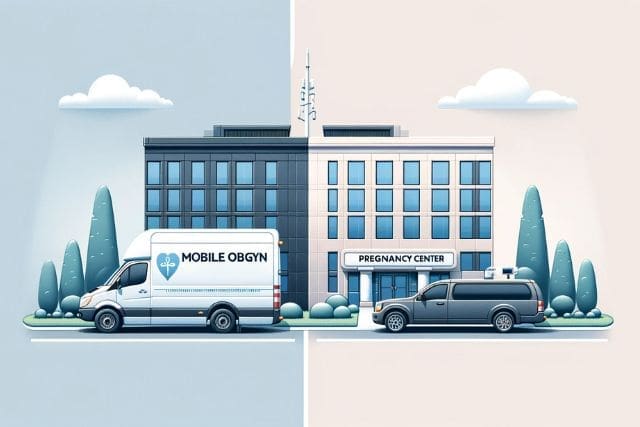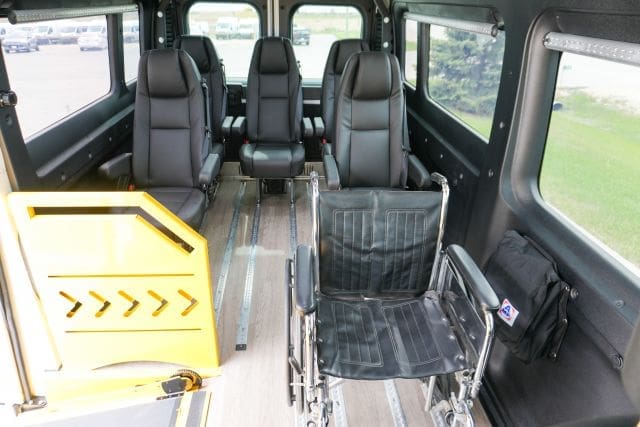If you’re considering starting a mobile OBGYN clinic or traditional pregnancy center, knowing the differences between these options is important. Each option has differing patient demographics, accessibility, and logistics. Failure to recognize and understand these things can have a negative impact on your program, who you’ll reach, and inevitably, the overall quality of healthcare you’ll provide.
At AVAN Mobility, we’re all about helping organizations who help people overcome barriers to healthcare. When you’re pregnant, the last thing you want to be worrying about is how you’ll make it to the nearest hospital when the time comes to give birth. Unfortunately, this is a sad reality that many women face across the U.S. Our Mobile Clinic Van can help out in situations like that.
In this article, you’ll learn about the differences between mobile OBGYN clinics and traditional pregnancy centers. We’ll also leave you with some information about our Mobile Clinic Van and how it’s so useful for overcoming healthcare hurdles.
What is a mobile OBGYN clinic?
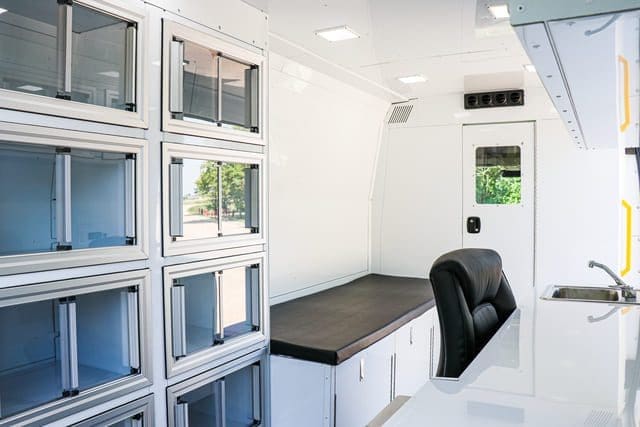
OBGYN stands for obstetricians and gynecologists. They’re doctors who take care of women’s health, especially during pregnancy (obstetrics) and dealing with the female reproductive system (gynecology).
“Mobile” means the clinic isn’t stuck in one place. Instead, think of it as a doctor’s office that travels to different locations.
You can customize a mobile OBGYN clinic with all the necessary tools and equipment for pregnancy check-ups, tests, and even minor treatments.
It’s super convenient. Instead of patients having to go to a big, busy hospital or a distant clinic, the mobile OBGYN clinic comes closer to them, making healthcare more accessible. This special clinic caters to pregnant women and supports women with reproductive health needs, providing services in communities where healthcare might be hard to reach.
Depending on what type of organization you have, you can also provide advice on family planning and additional support for female health concerns.
What is a traditional pregnancy center?
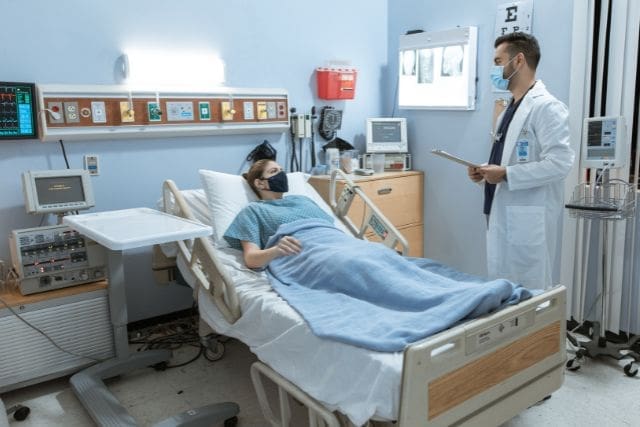
Traditional pregnancy centers are fixed clinics that provide medical care and support to pregnant women. These centers exist to make sure pregnant women are safe throughout their pregnancy.
In regular pregnancy centers, moms-to-be get important medical care designed just for them. This includes regular check-ups, talks with healthcare experts, and getting the medical services they need. The goal is to keep an eye on the health of both the mom and the baby, making sure everything goes well during the pregnancy.
Traditional pregnancy centers aim to equip women with the information they need to feel confident in their journey to motherhood. Through educational resources and counseling, they ensure that pregnant women have a clear understanding of the various aspects of pregnancy, childbirth, and postpartum care. This knowledge empowers women to make choices that are best for their unique situations.
What are the differences between mobile OBGYN clinics and traditional pregnancy centers?
Now that you know more about the two types of options for helping pregnant women, let’s take a closer look at some of the differences between them. Each has its own way of supporting expecting moms, but there are big differences in how they work.
Mobile OBGYN clinics
Mobile OBGYN clinics are clinics on wheels. They can go to many different places around the country to help pregnant women. They can reach places that are far away or areas that don’t have many healthcare options.
Flexibility: Since these clinics can move around, they can go to remote communities. This makes it easier for pregnant women in those areas to get the care they need. This is helpful because then pregnant women don’t have to worry about driving or relying on someone else to drive them.
Timing: Mobile OBGYN clinics can be set up at different times, even in the evenings or on weekends. This helps pregnant women because they can get the care they need without changing their daily plans too much.
Services: These clinics are ready to help with lots of things like regular check-ups, ultrasounds, and teaching about pregnancy. This means pregnant women can get many services in one place, making it easier for them.
Traditional pregnancy centers
Traditional pregnancy centers are similar to mobile OBGYN clinics but are fixed in one spot and don’t move. Because of that, it can be hard for pregnant women who live far away from the center because it might take a long time to get there. What if they don’t have transportation? What if their car breaks down on the long journey?
Time limits: Traditional centers often have specific times they are open. This might not work for pregnant women who have jobs or family duties. It can be tricky to find a time that fits with their schedule.
Specific services: While traditional centers are helpful, they might not have all the services in one place. Some things might need to be done at different facilities. This can be a bit more complicated for pregnant women.
Why Mobile OBGYN clinics are better for women in remote areas
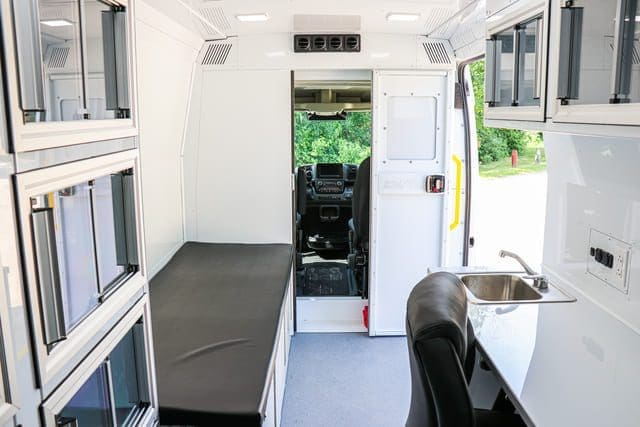
Mobile OBGYN clinics offer a lot more versatility compared to traditional centers. This is a big deal because it means more pregnant women can get help without traveling too far.
No long journeys: Imagine if you lived far away from a traditional pregnancy center. Getting there might take a long time and cost a lot of money. Mobile clinics solve this problem by bringing care closer to home.
Less stress for moms: Being pregnant can be stressful, especially if you have to travel a lot for check-ups. Mobile clinics take away this stress by coming to women. This is a big help for pregnant moms in remote areas.
Flexible schedule for busy moms: Pregnant women have a lot to do, and their time is important. Mobile OBGYN clinics understand this and try to make things easier. Mobile clinics can be set up at different times, even outside normal working hours. This means pregnant women with jobs or family duties can still find a good time to get the care they need.
No rushing: With traditional centers, women might have to rush to get there on time. Mobile clinics give pregnant women more time to plan, making things less stressful.
What’s the right option?
In the end, when it comes to helping pregnant women who face barriers to healthcare, mobile OBGYN clinics are the ideal solution due to their ability to go anywhere and help anytime. For pregnant women in remote areas, these clinics are a blessing. They bring care closer, reduce stress, and fit better with busy schedules.
Traditional pregnancy centers are good too, but they have limits that might make things harder for some expecting moms. Mobile OBGYN clinics are the modern way to make sure all pregnant women get the care they need, no matter where they live.
AVAN Mobility’s blueprint for your next steps
You came to this article looking for more information on mobile OBGYN clinics and their differences from regular pregnancy centers.
You learned that mobile OBGYN clinics offer much more versatility for pregnant women in remote areas.
At this point, you’re probably wondering what to do next. You’ll want to read our article explaining what our Mobile Clinic Van is. Your organization can turn it into a mobile OBGYN clinic and use it to serve pregnant women all across the country.
You should also look at our article on how to start a mobile clinic program. This article will provide helpful insights into the 5 steps on how to get started.
If you have any questions about how you can use the Mobile Clinic Van to help pregnant women, don’t hesitate to click the button below.
